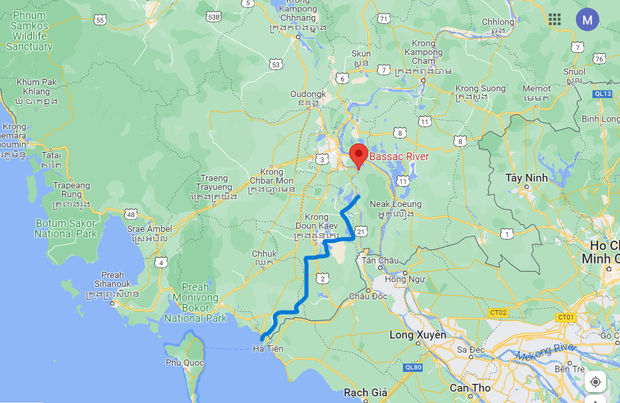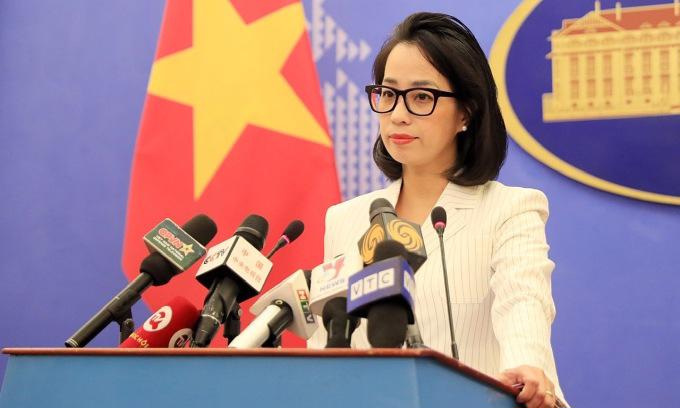Vietnam is issuing increasingly urgent warnings over Cambodia's $1.7 billion plan for the Funan Techo canal, a massive inland waterway that could severely disrupt the fragile ecology of the vital Mekong River basin shared by the two nations.
Construction on the ambitious project is slated to commence by late 2024.
The proposed 180km shipping channel would allow 1,000-tonne cargo vessels to navigate directly from the Gulf of Thailand into Cambodia's heartland, catalyzing inland transportation and industrial development for the still-developing country.
But Vietnamese officials and environmental experts fear it risks choking off over half the Mekong's discharge to Vietnam's fertile "rice bowl" delta during dry periods, potentially worsening droughts, saltwater intrusion, and devastating impacts on agriculture, fisheries and biodiversity.
On May 5th, Ministry of Foreign Affairs' spokeswoman Pham Thu Hang urged Phnom Penh to "coordinate closely" on rigorous cross-border impact assessments and mitigation strategies before pushing ahead. "Vietnam supports Cambodia's development," she stressed, "but we must fully assess any project affecting our shared water resources."
Her appeal reflects rising anxiety among delta communities over the canal's dire ecological consequences. During an April consultation in Can Tho City, a Mekong Delta rice hub for Vietnam, a chorus of provincial representatives raised strident concerns over potential disruptions to river flows that nurture Vietnam's vital rice crops, inland fisheries and unique wetland ecosystems like Tra Su.
Dire predictions of hydrological havoc
According to scientists like Le Anh Tuan of Can Tho University, in extremely dry years akin to 2016 and 2024 the canal could slash over half the Mekong's discharge reaching the low-lying delta that Vietnam depends on for irrigation and aquaculture.
Severe droughts, crop damage from saltwater intrusion across over half the cultivated area, and supply disruptions all loom as potential impacts.
Tuan warned the canal's embankments, while unlikely to severely impair upstream floods, risk diminishing annual inundation that rejuvenates Cambodia's Tonle Sap lake and the Long Xuyen quadrangle - altering freshwater distribution critical for agriculture and ecosystems like Anlung Pring wetlands that span the border.
Low flood levels could undermine regulating structures like Vietnam's Tha La dam.
Murky plans, limited data
The predicted devastation stems from scant technical details Cambodia has provided so far on the contentious canal's engineering design and operational plans.
A recent study by Vietnam's Southern Institute of Water Resources Research estimates the canal's planned dry season diversion of 1.12 billion cubic meters amounts to just 2% of Mekong flows based on 2020 drought data.
However, many Vietnamese experts caution the impacts could be far more severe, especially during periods when Cambodia requires intensive irrigation.
The study also suggests greater disruption is likely during such times, indicating acute water shortages could threaten the delta, with projected impacts varying based on Vietnam's water storage capacities and supply networks. Reductions of up to 5% in Mekong flows reaching the delta are possible compared to 2020 drought conditions, according to the analysis.
Pham Ho Quoc Tuan of the Southern Regional Hydrometeorological Center affirms "the project will definitely impact downstream areas," but the extent remains uncertain pending full disclosure of final operational plans and thorough cross-border analysis.

Upheaval or opportunity?
Despite the disputes, Foreign Ministry officials have urged both nations to uphold principles of the 1995 Mekong Agreement they signed, conducting transparent impact assessments and developing joint mitigation strategies.
Spokeswoman Hang affirmed "Vietnam prioritizes good neighbourly relations and comprehensive cooperation with Cambodia," applauding its development progress while insisting on rigorous safeguards for the shared river.
The talks represent a critical test of whether the traditional allies who jointly battled colonial oppression can reconcile economic aspirations with the Mekong's fragile ecology.
"Our nations' shared history underscores our partnership's importance," Hang stated. "Our hope is Cambodia works with us to fully assess impacts and manage the river sustainably for all riparian nations and future generations."
For Cambodia's part, the canal promises to transform its interior by providing direct maritime access, boosting trade volumes. In 2023, Vietnam was Cambodia's second-largest export market after the US. Two-way commerce surged 24.5% year-on-year to $2.32 billion in the first quarter of 2024 alone.
Streamlining cross-border logistics could help Cambodia progress from exporting raw commodities to higher-value finished goods - aligning with Vietnam's vision of transitioning the delta to more sustainable agricultural production focused on high-tech, low-emission crops.
"Improved cross-border trade enabled by the canal could benefit both nations if balanced against ecological impacts," stated Trinh Cong Van of the Mekong Water Technology Innovation Institute.
But he cautioned serious questions remain over whether such economic gains can offset potential losses to the delta's pivotal role as a biodiversity hotspot and rice export hub.
A river's lifeblood, a river's future
For millennia, the Mekong's raging nutrient flows have enabled the rise of Southeast Asian civilizations while providing food and protein for over 60 million basin residents today.
Its annual monsoon pulses rejuvenate agriculture, fisheries and wetlands like Tonle Sap through dispersing sediments that sustain the region's rich tapestry of life.
Yet as climate change unleashes more extreme droughts, floods and sea level rise, collaborative governance of the river's flows grows ever more vital to millions' ecological security and economic development.
Major harm could already be catalyzed by the time comprehensive data emerges on the Funan Techo canal's impacts.
Anticipating unavoidable cross-border effects through flexible, integrated policymaking and dispute resolution will be paramount. Both nations must balance economic aspirations against environmental realities through statesmanship, transparency and pragmatism.
The Mekong's very depths have flowed with blood spilled in past conflicts over its control. Through cooperative governance and equitably sharing its liquid wealth, Vietnam and Cambodia can now transform this mighty river into an artery of mutual prosperity - not future discord.









 Google translate
Google translate